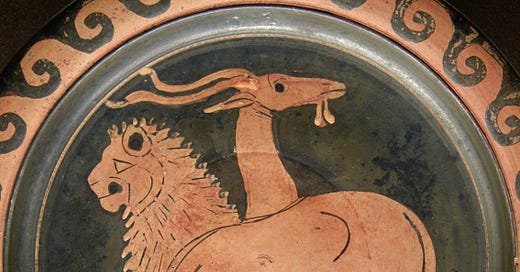“Essentially, antisystems are negative world views: discrete bodies of teachings that organize and rationalize the predatory impulses that determine the behavior of an ethnic or subethnic grouping. Gumilev described these as "vampire concepts” that embody a deep and diabolical sense of purpose."
In their specifics, antisystems vary greatly among different groups and across historical periods, but they share certain basic convictions and orientations. They are always characterized by a "negative view of the world", which sees the material universe and the domains of everyday life as a realm of suffering and the source of all evil." As a consequence, all antisystems advocate the rejection of the material world (mirootritsanie or zhizneotritsanie) in all its complexity and diversity in favor of oversimplified abstract principles and unyielding absolute ideals.
Indeed, zhizneotritsanie is the principal motivational sentiment of the antisystem, commonly expressed either as a call to redesign the world or, more simply, to destroy it.
This general hostility to the world is linked to a more specific hostility to the ecological realities of the biosphere. In an antisystem, "man opposes himself to nature, which he sees as a realm of suffering. Despite this, he is obliged to include his own body in the biosphere, which he rejects, and from which it [therefore] becomes necessary to free his 'soul,' that is to say, his consciousness.
Many ways to accomplish this have been suggested, but the underlying principle is always the same: the rejection of the [natural] world as the source of evil."
In the final analysis, of course, this struggle must be futile, for no chimeric antisystem is capable of extricating any ethnic group completely from its ecological emplacement in the natural world. So rather than genuine liberation from the natural environment, the antisystem summons its adherents to a struggle that can only lead to ecological desecration and destruction.
An antisystem violates all of ethnic life's positive natural qualities. The veneration of heritage and tradition, which in healthy ethnies operates within the family structure through signal inheritance and helps insure the maintenance of ethnic integrity and continuity, is shunned. To the contrary, an antisystem looks obsessively to the future rather than reverentially to the past, and is dominated by individuals "with a futuristic sense of time." Antisystemic values and attitudes are codified and formalized through stylized written texts, which cannot be absorbed spontaneously but have to be explicated and taught in a formalistic manner.
“And the difference between 'living' traditions, absorbed by children as they are raised, and 'contrived' (sdelannye) traditions, in other words, those based on books, is the same as the difference between living organisms and inanimate objects. The former, as they perish [in a natural manner). are resurrected in the form of their posterity. The latter, by contrast, are gradually destroyed, with no hope of resurrection."”
- Mark Bassin, “The Gumilev Mystique”




